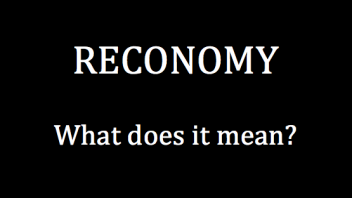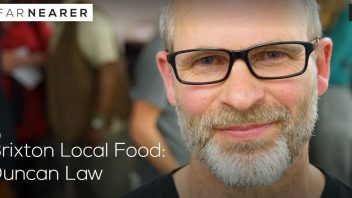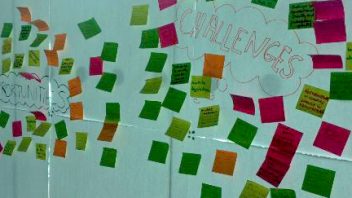
What does reconomy mean? It’s an amazing word and we’re really excited about how it’s growing into a word of significance…. so what does it mean? It’s being used as part of the name of a few organisations, each with a slightly different vision, and each with different but often interlinked meanings. So, I wanted to put together a neutral definition of the word “reconomy” that could be added to Wikipedia. Before drafting the definition I engaged some of the word’s early adopters and have included many of their thoughts in full below.
If you search for reconomy on wikipedia you’ll find no definition and it might just stay that way for the near future. Interestingly the only thing the search does reveal is a an external link to reconomy.org and other Transition Network content. However, wikipedia doesn’t currently accept articles on neologisms or protologisms (new words) until they have “notability”, which is, as stated by wikipedia;
“If a topic has received significant coverage in reliable sources that are independent of the subject, it is presumed to satisfy the inclusion criteria for a stand-alone article.”. However, the word reconomy is predominantly used by organisations, domains and entities as a proper name i.e. not independent of the subject. Wikipedia goes on to say that as Wiktionary‘s inclusion criteria differ from Wikipedia’s, that project may cover neologisms that Wikipedia cannot accept.
So i’ve added the “first attempt” definition of reconomy on wiktionary. This is by no means a last attempt and please do engage if you’d like to improve the definition. The definition is born out of discussions with key people using the term and an adaption of the definition of the word economy. I’ve also reproduced my definition below in full;
Wictionary Definition of the word reconomy
Etymology
An informal portmanteau of the word “economy” and the “re” prefix designed to change the meaning of the word economy. It’s likely that the term reconomy has been used informally and formally for many years but with its early usage going undocumented or not publically available. The first documented use is Storm Cunningham’s 2008 book,Rewealth (McGraw-Hill May 2008).
Pronunciation
- (Received Pronunciation) IPA(key): /ˈɹiːˈkɒn.ə.mi/, /ˈɹɪˈkɒn.ə.mi/
Noun
- Effective management of the resources of a community or system with particular emphasis on reusing, renewing, recycling, reclaiming or reselling. Emulating nature’s circular action in contrast to a linear economy where products are made, used and then disposed of.
- Frugal use of resources and respecting resource limits with the net effect of restoring, regenerating and reviving, in contrast to an economy that destroys, deprives,deteriorates and degrades.
- The economic expression of a socio-economic movement that aims to reboot, reignite, rethink, redesign, retool, reinvent, reimagine, redo and a repositioning the economy.
- A renaissance or rebirth of genuine community as an economic base for sustainable practice.
- A resilient and where appropriate re-localised system or systems of production, distribution and consumption.
- Collective focus of the study of an evolved system that goes beyond money, currency, trade, and resources.
- A redefined measurement of progress, which is geared around the growth of community wellbeing rather than national Gross Domestic Product (GDP).
- (theology) The end of economics as a method of divine government of the world.
- (archaic) Management of one’s residency as an integral and connected part of the wider community and ecological environment.
References
Its first documented use was by Storm Cunningham in his 2008 book, Rewealth (McGraw-Hill May 2008). Storm said “I think I first started using the word in my talks around 2005” with the meaning linked to restoration economy.
Also in June of 2008 Reconomy (Holdings) Limited filed to Trademark the word Reconomy specific to its recycling and material handling activities.
In July of 2009 the word reconomy was entered into the urban dictionary by an individual with a definition focused on economic recession. In 2009 there is also this unrelated blog post discussing the meaning of the term.
From January 2011 the Transition Network went public with a project called the REconomy Project, which aims to help people build new local economies in their area. This project had been operational behind the scenes since mid 2010.
In June 2011 Kevin Parcel registered the domain reconomy.net and set up an initiative to develop The Reconomy Global Timebank and the Reconomy Global Cooperative.
As of September of 2011 Project Reconomy had a twitter feed under that name with their work focused on empowering people to stop home foreclosures.
Since then there have been other users but the above are the most noticeable early adopters of the word.
Only the urban dictionary version gives a meaning contradictory to the idea of a new economy or that the word reconomy depicts a positive version of the economy. However, one individual added the urban directory meaning and there is no other public usage that corresponds to this.
—ShaneHughes (talk) 19:13, 17 March 2014 (UTC)
Additional thoughts
These additional thoughts were not included on wiktionary. Part of the beauty of the word reconomy is that it means different things to different people. For example, see these discussions here and here. This leads to an important aspect of “reconomy” as an ideology, which in my view, is a mix of a diversity of economic approaches that aspire to stay diverse rather than developing into one single ideological domination or monopoly.
Below you can see in more detail these different entities and organisations and how they use the word reconomy.
Storm Cunningham’s definition
Storm stated that;
My off-the-cuff definition is the same as the definition I used for a “restoration economy” in my 2002 book, The Restoration Economy (Berrett-Koehler):
A reconomy is a local, regional, national, or global economy whose wealth creation is based primarily on restoring damaged or depleted natural resources, remediating contaminated properties, renovating/reusing existing buildings and infrastructure, and regenerating existing communities (“rewealth”).
This is as opposed to a “deconomy”, whose wealth creation is based primarily on the depletion of natural resources, and on the development of previously-undeveloped land (“dewealth”).
I should point out (to further clarify my definition of a reconomy) that new buildings and new infrastructure can be a part of the reconomy, also, provided they are built on previously developed land. In that case, it’s the property that’s being regenerated in value, rather than the structure on it.
Not all buildings and infrastructure are worth saving. A major part of the regeneration of many cities is getting rid of crappy buildings, and removing inappropriately located infrastructure (such as waterfront highways and highways that severed the community).”
Reconomy (Holdings) Limited’s definition
We are not aware of Reconomy (Holdings) Limited having an explicit definition of the word reconomy but in 2008 they filed a Trademark for the word reconomy, which was described as;
“Class 40: Treatment of materials; recycling of waste and trash, recycling of food wastes; incineration and destruction of waste and trash”
In 2012 Reconomy (Holdings) Limited broadened their Trademark to;
Class 19: Non-metallic building materials; aggregates for building and construction; asphalt, pitch and bitumen; concrete.
Class 37: Building and construction services and; tool and plant hire; rental of construction equipment; skip and container rental; building construction information and advisory services; shopfitting services; building maintenance and refurbishment services; building repair and installation services.
Class 40:Treatment of materials; recycling of waste and trash, recycling of food wastes; incineration, destruction and disposal of waste and trash; waste management services; land remediation services.”
Clearly their widening of the Trademark covers their wider business activities but their original usage is based on the recycling of materials.
The Urban Dictionary
The definition as per the urban dictionary entry;
“A recession economy.
In this reconomy it’s hard to find a job.
In a reconomy government agencies take unproven measures to rectify the situation. by pfflashak July 26, 2009”
Notably the above definition was put forward by an individual and I have not seen it used like this elsewhere.
REconomy Project
REconomy Project also had no explicit definition of the term but the implicit definition is linked to their objective of;
“We are here to help build the capacity of Transition Initiatives, and other similar community groups, to transform their local economies.”
When some of the key Transition and REconomy Project team were asked about the definition of the term, there was a coalescing around a restorative economy. This is best summed up by Rob Hopkins’ comment;
“I was struck by the piece Peter sent round recently to his list, the interview with Gus Speth… in it he says:
“There are two big steps that are staring us in the face, I think. One is the great possibility that we have right now — without Washington, without our politicians — to begin to bring the future into the present in our local communities around the country. And indeed, we see that happening: We see transition towns, we see community revitalization efforts and new business forms — public-private hybrids, profit/not-for-profit hybrids, social enterprises, co-ops, public banking initiatives. There are all kinds of things where people are adopting new lifestyles in communities and neighborhoods. And this is happening across the country. It’s enormously encouraging, and it’s something we can all do. We can all have sustainable communities, where we define sustainability in a full spectrum, 360-degree way, so that it’s not just environmental sustainability, but it’s a restorative local economy — an economy that restores people, families, neighborhoods, and environment and ecosystems”.
Made me think, REconomy, it is short and has proved highly ‘catchy’, but when people ask what it stands for, I kind of fudge it talking about Resilience Economies and stuff, but “restorative economies”, that has a really nice ring to it. Just a thought, but if you like it, it might be that we could more explicitly state that that’s what ‘REconomy’ stands for. Or maybe it already stands for something better that I’ve missed. I love ‘restorative economy’ though, it works, as he argues, on a number of levels. As Frances just pointed out, it also has the nice connotation of restorative as in visiting the Baths in Bath for a “restorative”, something to nourish the constitution.”
www.reconomy.net
When asked what is the definition of the word reconomy the reconomy.net founder Kevin Parcel stated that;
“I think Reconomy describes a movement – a renaissance of genuine community as an economic base for sustainable practice.
Reconomy Global Cooperative is a group engaged in that, Reconomy Project is engaged in that, and many others. This transition or movement is happening and I don’t know any better word to describe it.”
Project REconomy
Project REconomy also has no publically available explicit definition but we can get a sense of how they use the word through their aims;
“Project REconomy seeks to create an economy that works for main street, not just Wall Street. Our focus issue is foreclosure because it is a strategic point of intervention in the larger effort to challenge the power of Wall Street, big banks, and corporate economic interests and to create an economy that works for all of us, not just those at the top.”
Author: Shane Hughes, REconomy Project.










Shane- I like what you are doing and where this is going. I think i will incorporate some notion of experimentation like we do in TTs. That this is a worldwide experiment in build new kinds of economies that are decoupled, to some extent, from the industrial growth system. That they are a way of providing ways of making livelihoods (to some extent) that lie outside of the constraints of the capitalist system.